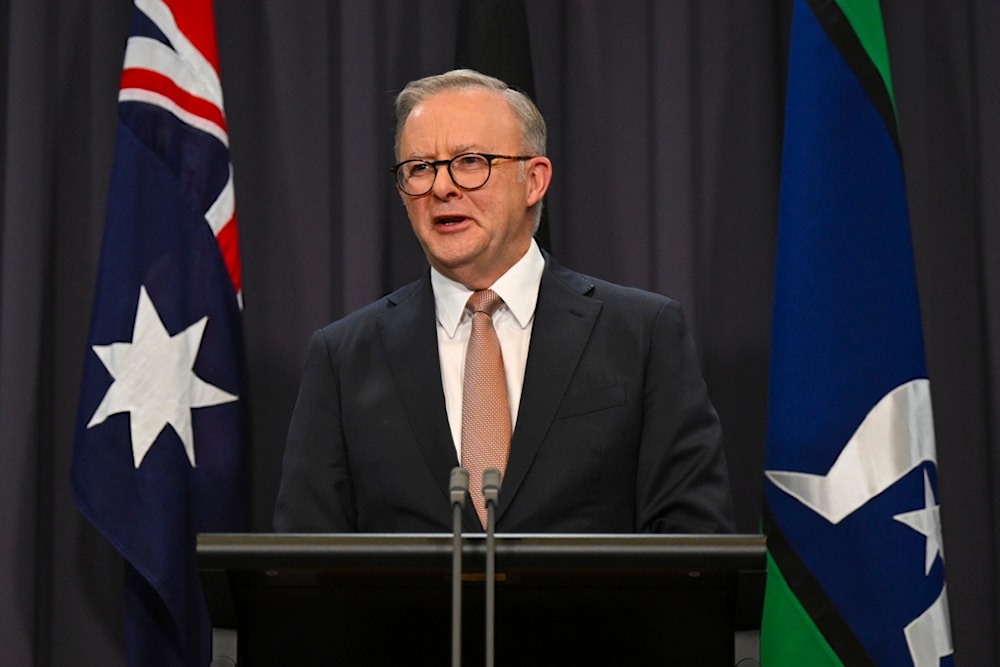Australia national security, immigration ministers sacked amid scandal
The Australian Prime Minister has replaced his national security and immigration ministers following a debacle regarding incarcerated immigrants.
-

Australian Prime Minister Anthony Albanese addresses the media at Parliament House in Canberra, on Monday, June 17, 2024. (AP)
Australia's Prime Minister, Anthony Albanese, replaced his national security and immigration ministers on Sunday in an attempt to repair their scandal-riddled portfolios.
Australia's Department of Home Affairs was significantly scrutinized after being compelled to release over 100 immigration detainees, many of whom had been convicted of serious crimes like assault, kidnapping, and murder, following a landmark court decision.
Albanese attempted to put an end to the politically damaging situation by reassigning Home Affairs Minister Clare O'Neil and Immigration Minister Andrew Giles to different portfolios, with Tony Burke, a veteran government troubleshooter, taking over their responsibilities.
Some of the released detainees were later charged with additional crimes, generating negative publicity for the center-left Labor government. In response, officials hurried to equip the released individuals with ankle monitors and enforce other stringent conditions, such as curfews.
Deep-dive into Australia's migrant policy
The previous policy stated that migrants could be held indefinitely in Australia if they were denied visas but could not be legally deported to another country, such as when they faced the death penalty in their homeland, resulting in many migrants being confined in Australian detention centers for years, with no prospect of release.
However, a High Court ruling in November deemed this practice "unlawful", overturning a 20-year-old bipartisan policy and leading to the release of nearly 150 individuals. Among those released, over 70 had been denied visas due to convictions for assault and other violent crimes, and seven had been convicted of murder or attempted murder.
Australia first implemented the mandatory detention of people without visas in 1992. According to data from Human Rights Watch, the average immigration detainee in Australia is held for 708 days, with over 120 individuals having been in detention for more than five years.
Australia's stringent border policy was initially developed in response to a large influx of people arriving by boat from Vietnam, Cambodia, and China. However, the policy has faced criticism from refugee advocates, with the United Nations refugee agency labeling it as "arbitrary" and "punitive".
Anti-torture mission in Australia suspended after UN inspectors barred
In 2022, the United Nations unexpectedly terminated its anti-torture mission in Australia after inspectors were denied access by the Australian government to numerous prisons, with a major monitoring agency slamming the encounter as an "embarrassing debacle".
The UN inspectors, who were tasked with examining facilities as part of a voluntary agreement to minimize inmate maltreatment, said they made the "dramatic" decision after being refused admission at "many" jails and detention centers.
Australia was in "clear breach" of its international commitments, according to lead inspector Aisha Mohammad, a Supreme Court judge in the Maldives. "Despite our numerous efforts to explain our preventative mandate, this was clearly not understood," she said.
The UN delegation said it had "been prevented from visiting several places where people are detained... and was not given all the relevant information and documentation it had requested."
Human rights abuses have been reported repeatedly in Australia's jails, adolescent detention centers, and immigration compounds, particularly against Aboriginal people.

 3 Min Read
3 Min Read








